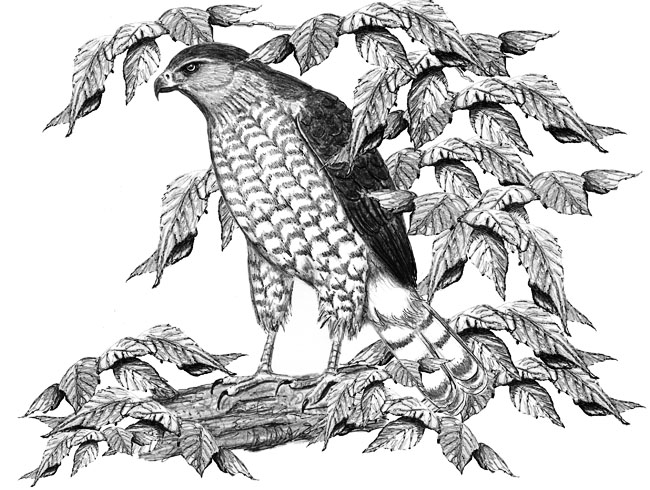
Dear Bird Folks,
I really enjoy reading your weekly column in the newspaper, and it’s the first thing I turn to. My question is about hawks. It seems the population of songbirds has dropped off in our area, yet the hawk population appears to be on the increase. I’m worried about the songbirds. Are there any predators that eat hawks?
–Jim, W. Yarmouth, MA
Thanks, Jim,
Thanks for those nice words about our writing. If this newspaper were in color, instead of black and white, you’d see my response was blushing. I’m flattered that you read the bird column first. The first thing I turn to each day is the comic strips. I keep hoping that Moon Mullins will be back in the paper, but so far no luck. The answer to your question is yes, hawks have enemies. Larger hawks will eat smaller hawks and Great Horned Owls will eat hawks of any size. Power lines are a problem and so are collisions with cars…and occasionally a few hawks are taken out by drones.
When it comes to worrying about which creatures are being eaten, we all seem to have our personal prejudices. A lot of people were upset when horsemeat found its way into the European fast food industry. Yet, these same people were totally okay with the bacon that was also on their horse burger. (Didn’t anyone see the movie Babe?) We are saddened when a hawk eats a cardinal, but no one cares when an Osprey grabs a fish. Are horses and cardinals somehow better and more worthy of our concern than fish or pigs? Maybe, but don’t tell that to a guy who has a koi pond or to Babe.
When it comes to hunting, not all hawks created equal. Some hawks, called “buteos,” are designed for hunting in wide-open spaces. Buteos are fairly large hawks and tend to eat mostly mammals. If you love songbirds and hate mammals, this is the hawk for you. It’s not that these large hawks wouldn’t like to eat birds, but they usually aren’t fast enough to catch little birds or agile enough to fly through the forest to catch them. But there are hawks that can do what buteos can’t and they are called “accipiters.” Accipiters are built for speed and maneuverability. Chasing songbirds through the woods is no big deal for them. These are the hawks that you aren’t happy with, Jim.
The two most common accipiters on Cape Cod are Sharp-shinned Hawks and Cooper’s Hawks, and both of them eat a lot of birds. In this column I’m going focus mainly on Cooper’s Hawks because their local population has been increasing in recent years. Besides, Cooper’s is easier to write than sharp-shin. Hyphenated words drive me nuts.
The mammal-eating buteos (like red-tails, for example) tend to sit on exposed perches, waiting to pounce on any unsuspecting creature that comes within sight. But Cooper’s Hawks are shy and would rather stay hidden in the foliage while hunting. That’s why we don’t always know when they are around. Cooper’s can also be active hunters, flying through the woods at great speeds in hopes of surprising prey. In the forests they will use bushes and vegetation to conceal them as they fly. Here in suburbia, these crafty hawks will use buildings, cars and even fat guys to disguise their line of attack. In my yard the local Cooper’s Hawk loves to fly alongside the garage and then take a sharp left towards the bird feeders. This, of course, causes all of the birds to scatter. Well, all except for the House Sparrows. The sparrows simply dive into the bushes. At this point, the hawk will land on the ground and rush at the sparrow-bush like a football player going for a touchdown. The hawk is hoping it will scare the little birds to fly out of their hiding places, but they rarely do. They just move deeper into the bush, all the while screaming to the hawk something about becoming a vegetarian.
As I mentioned earlier, Cooper’s Hawks are becoming more common in our area. Why? Could their habit of living off of feeder birds be the reason for the increase in their population? I’m sure food availability is a factor, but the main reasons have to do with changes in the law and the landscape. At one time people were allowed to legally shoot hawks for fun (nice, eh?) and not too long ago farms covered much of Massachusetts. But as the farms disappeared, trees reclaimed the abandoned land. Today Massachusetts is a highly forested state and trees are what Cooper’s Hawks love. In addition, Cooper’s Hawks benefited when they banned DDT, but everything benefited when they banned DDT (except maybe the chemical companies).
Are Cooper’s Hawks causing a drop in the songbird population in your backyard, Jim? Well, sort of, but not in the way you think. Birds tend to avoid areas where hawks are hunting, and thus your feeders may be quiet for a while. But a temporary lack of songbirds doesn’t mean there has been a significant drop in their population. (It also doesn’t mean your birdseed is bad, so don’t call me and complain.)
Speaking of complaining: It is now mid-May and this is the prime bird-feeding season. Orioles, hummingbirds and many other birds have returned from the south. My birdseed sales are way up and most people have flocks of birds on their feeders. Mid-May is like Fat Tuesday in the bird world, but after Fat Tuesday comes Lent. In this case, Lent is June. June is when parent birds feed their babies worms and insects, and thus have less interest in our feeders. But don’t worry, come July the birds will be back. In the meantime, reread the last sentence in the previous paragraph. Please!